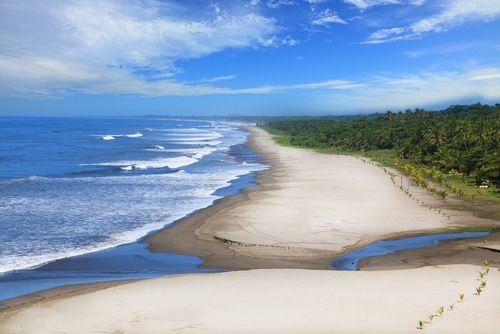Nicaragua
WHAT VACCINES DO I NEED FOR NICARAGUA In 2024
The Government of Canada and the CDC recommend the following vaccines for travelling to Nicaragua Islands In 2024: Traveler’s Diarrhea, Hepatitis A, Hepatitis B, Rabies, Flu, COVID-19, Typhoid fever.
Nicaragua has long suffered from an unstable political situation and a revolution following the independence of the country. These sad events now belong to the past and travelers are coming back to discover the stunning “Land of Lakes and Volcanoes”. Whether you wish to surf the mighty Pacific waves, snorkel the crystal clear Caribbean Sea, climb an active volcano, get lost in a lush jungle home to colorful macaws or discover magnificent colonial vestiges, you will find what you are looking for in Nicaragua. The culture and traditions of this Central American nation are absolutely fascinating, especially the singular passion of the Nicaraguan people for poetry.
HEALTH ADVICE FOR TRAVEL IN NICARAGUA
Risk of Zika in Nicaragua Learn More >>
We make every effort to ensure that the information posted on our website is up to date and accurate according to the latest public health recommendations; however, it is impossible for us to make changes on a daily basis.
For the most current travel health recommendations, please call our clinic to make an appointment with one of our travel health professionals.
NICARAGUA – RECOMMENDED VACCINES
| Hepatitis A | Recommended for all travelers. |
| Tetanus – Diphteria – Pertussis Vaccine | Tetanus: In exceptional circumstances (eg, stay in a region where access to health care is limited), for a person aged 18 years or older, 1 dose of DT may be given if 5 years or more has elapsed since the last dose. Otherwise, one booster dose at the age of 50*. Pertussis (Whooping Cough): 1 dose is recommended for pregnant women, for every pregnancy, regardless of immunization history and the interval since the last dose (betwen week 26 and 32). *Only applicable for Quebec. |
| Measles – Rubella – Mumps | Two doses recommended for all travelers born after 1970, if not previously given. |
| Flu – Influenza | Seasonal influenza occurs worldwide. The flu season usually runs from November to April in the northern hemisphere, between April and October in the southern hemisphere and year round in the tropics. Influenza (flu) is caused by a virus spread from person to person through coughing and sneezing or by touching infected surfaces. Everyone 6 months and older should get a flu vaccine yearly. Vaccine is recommended 14 days prior to departure. |
| Routine vaccines (dCaT, Polio, Meningococcal, Shingles, Pneumococcal, Hepatitis B, HPV, MMR & Varicella) | Recommended for all travelers |
| Typhoid fever | Recommended for most travelers, especially those who are staying with friends or relatives; visiting smaller cities, villages, or rural areas where exposure might occur through food or water; or prone to “adventurous eating” |
| Hepatitis B | Consider for most travelers; recommended for those who might be exposed to blood or other body fluids, have sexual contact with the local population, or be exposed through medical treatment (e.g., for an accident). |
| Rabies | For travelers at high risk of animal bites or being involved in activities with bats, dogs and other mammals. Clients who plan to visit remote areas may consider receiving this vaccine. Important to note the pre-exposure rabies vaccine is administered in 2 doses with one week interval between doses. Post-exposure vaccination is always recommended, even for those previously vaccinated. |
| Chagas Disease | Presence. All travelers should protect themselves against triatomine bugs. |
| Traveler’s Diarrhea (ETEC) | Talk to your health care professional about the risks and precautionary measures to take, as well as the Dukoral® vaccine. Important to note that the Dukoral vaccine is an oral vaccine given in 2 doses, recommended at least 2 weeks prior to departure. |
| Malaria | Malaria is present in this country. The risk may be region specific. Prophylaxis measures to be discussed with the health care professional. |
| Dengue Fever, Chikungunya and/or Zika | There are many illnesses that are transmitted via mosquito bites and unfortunately we do not have vaccines to protect us against most of them. It is important to inquire with your healthcare professional regarding the specific risks and the different illnesses presently in circulation. |
RECOMMENDED MEDICATIONS FOR TRAVEL IN NICARAGUA
| Antimalarials Recommended | Malarone, Doxycycline,Chloroquine or Mefloquine |
| Antibiotics Traveler’s Diarrhea | Ciprofloxacin, Azithromycin or Suprax. |
MEDICAL CARE IN NICARAGUA
Access to medical care is limited in Nicaragua, especially outside of the main cities. The Hospital Metropolitano Vivian Pellas and the Hospital Bautista, both located in Managua, the capital city, have different specialized services and provide satisfying medical care. In the event of serious medical issues, an air evacuation to another country is needed.
In case of emergency in Nicaragua, you can reach ambulance services at 505 265 1761. You will be taken to the nearest public hospital facility, unless you can prove that you can afford a private medical establishment. But be aware that emergency services can be limited in the country.
Numerous pharmacies are found in Nicaragua, they are usually well stocked. Note that the medicines sold in the country are mainly generics imported from Mexico or El Salvador, and they are often available without a medical prescription. It is always safer to bring your own medical kit, especially if you require specific treatments.
SECURITY ABROAD
There are reports of increases in crime in Nicaragua since April 2018. Police forces are limited throughout the country and extremely scarce outside of major urban areas.
EMERGENCY SERVICES IN NICARAGUA
In case of emergency, dial:
- Police: 118
- Medical Assistance: 128
- Firefighters: 115
